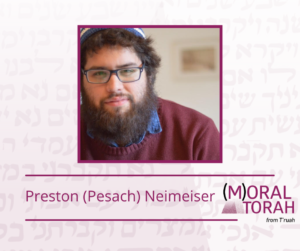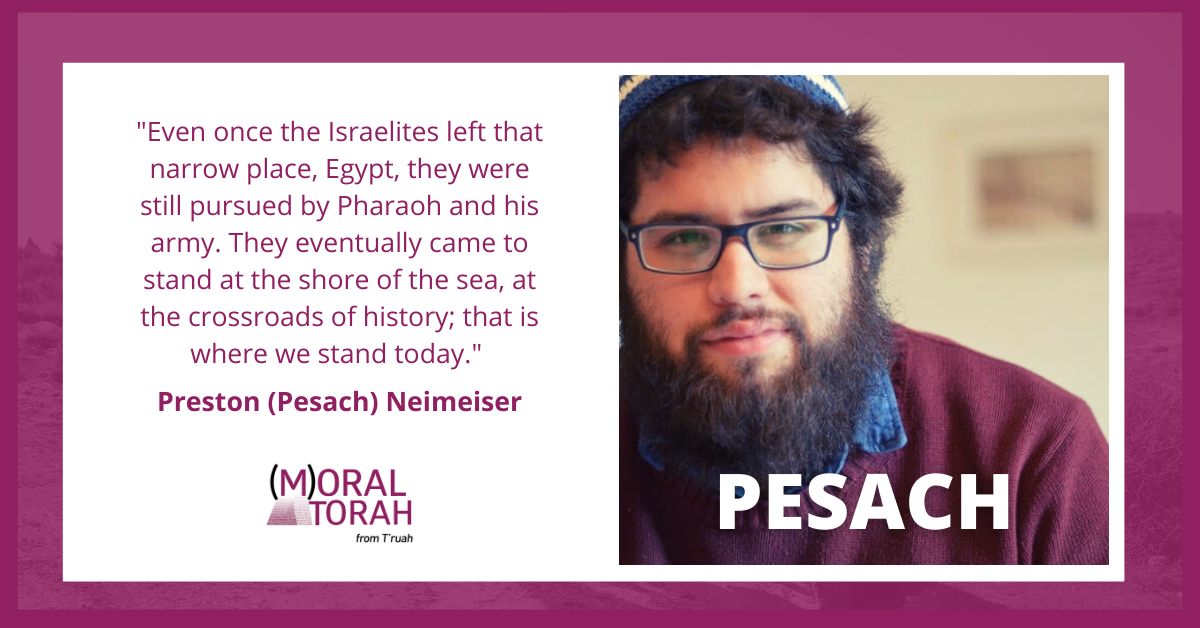A D’var Torah for Pesach by Preston (Pesach) Neimeiser
The Kabbalistic work Sefer Yetsirah connects each Hebrew month to an action and a human appendage: Elul, our month of sacred preparation, is associated with labor and the left hand; Kislev, with its darkness and fried food, is linked to sleep and the stomach; Nisan, when we tell the story of the Exodus around our Seder tables (and computer screens), is speech and the right foot (Sefer Yesirah 5:7). Why the right foot? Because it represents the first step out of slavery. The Pesach story is our prologue; the Exodus from Egypt was only the beginning.
After nine plagues, God tells Moses and Aaron that Nisan “shall mark for you the beginning of the months; it shall be the first of the months of the year for you.” (Exodus 12:2) This is in accordance with the view of Rabbi Yehoshua in the Babylonian Talmud, that the world was created in the month of Nisan (Rosh Hashanah 10b); essentially, God is saying here that in preparing to and eventually leaving Egypt, the world is recreated for the Israelites. The Torah then proceeds to explain the dramatic series of rituals the Israelites must undertake from the 10th to the 15th of the month in order to merit the passing over of God’s wrath, for which the Passover holiday is named in English.
Sign up to receive Moral Torah in your inbox each week.
Then God adds what might have been an unexpected instruction to the people: “This day shall be to you one of remembrance: you shall celebrate it as a festival to the Eternal throughout the ages; you and your generations shall celebrate it as an institution for all time.” (Exodus 12:14) In his commentary, Or HaChaim, Rabbi Hayyim ben Moshe ibn Attar (18th century Moroccan Kabbalist and Talmudist) asks why the Torah chooses to include both the phrases l’doroteichem (for your generations) as well as chukat olam (an institution for all time); at first glance they seem redundant. He comes to this conclusion:
“If the Torah had only used the words chukat olam, I might have concluded that this day is to be observed only during periods when the Jewish people are free and independent [i.e. in charge of their own chukim, laws]; when they are in exile, however, I could argue that there would be no occasion to especially mark that date. Therefore the Torah had to add the word l’doroteichem to tell us that the Passover rites are to be observed not only when we are free and independent but even when we are in exile.”
The Exodus from Egypt was a beginning, the world created anew. But even unfettered by slavery, the Israelites remained in exile with much work to be done before they could enter the promised land. As Emma Lazarus taught us, “until we are all free, we are none of us free.” Even once the Israelites left that narrow place, Egypt, they were still pursued by Pharaoh and his army. They eventually came to stand at the shore of the sea, at the crossroads of history; that is where we stand today.
Find more commentaries on Pesach.
Last year, with the advent of the COVID-19 pandemic, the world was created anew again. When we took our first step out of quarantine, we relearned firsthand the lesson of Emma Lazarus. Even if we had considered ourselves free, safely sequestered in our homes, the injustices imprisoning others could not be ignored. We were reminded of the power of speech, and together we lifted our voices to amplify and tell the stories yet unheard. The moment of racial reckoning that began in the summer was another beginning. We left Egypt only to be pursued by deeply entrenched, systemic white supremacy. Even the Song of the Sea is only a prologue until we can all join together in its singing. As I have seen in my work with the New Sanctuary Coalition, even when no longer incarcerated, those victimized by the system are still not free. Whether behind the bars of a cell or confined by the radio frequencies of an ankle monitor, they are not free, and so neither are we.
Now, we stand again between the unknown, tumultuous sea of the future and the armies of the injustices of the past behind us. Shall we draw back or cross over towards the promised land of liberation? Will we merit singing the song of freedom hand in hand, together in harmony? Only if we begin our pursuit of justice for all anew. Only if we diligently weave together what Rev. Dr. Martin Luther King Jr. called the “single garment of destiny” and Black abolitionist, author, and suffragist Frances Ellen Watkins Harper (1825-1911) called the “great bundle of humanity.”  Both are imploring us to recognize the truth of the interconnectedness of our liberation. Whether we know it or not, we are one. We will only realize this if we tell our Pesach story as a prologue. The Exodus from Egypt was only the beginning.
Both are imploring us to recognize the truth of the interconnectedness of our liberation. Whether we know it or not, we are one. We will only realize this if we tell our Pesach story as a prologue. The Exodus from Egypt was only the beginning.
Preston (Pesach) Neimeiser is a fifth-year rabbinical student at HUC-JIR in New York with monthly pulpit responsibilities at B’nai Israel Synagogue in High Point, NC, and a faith fellow with the New Sanctuary Coalition where he was first placed during his T’ruah summer fellowship last year. Find more from him at his website or on Twitter.

